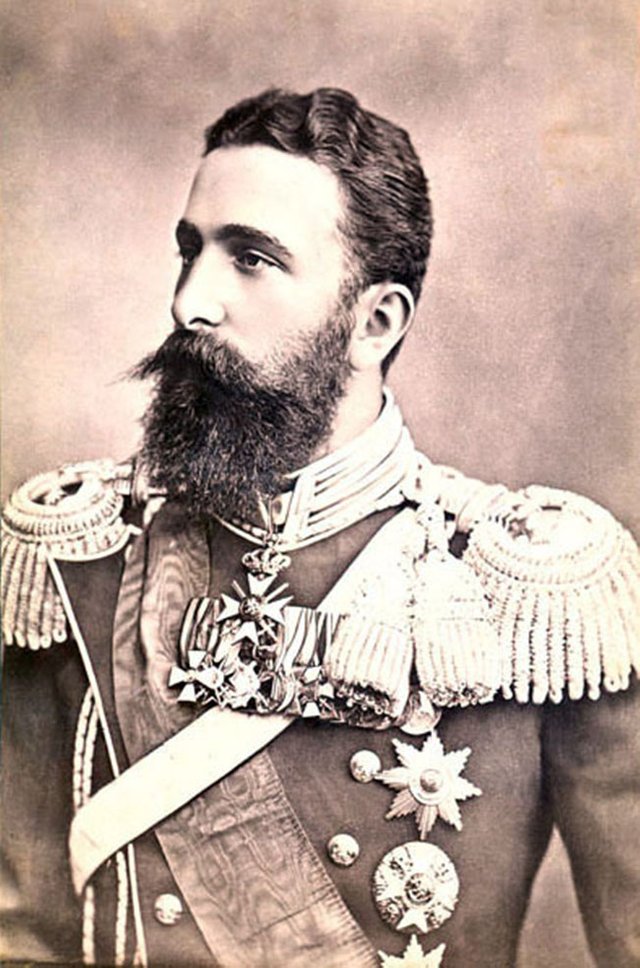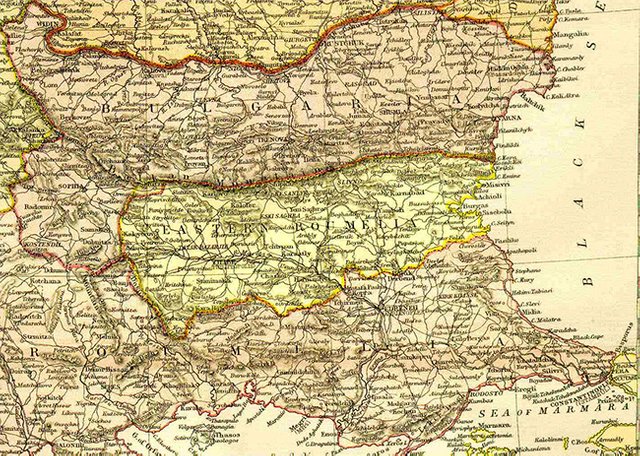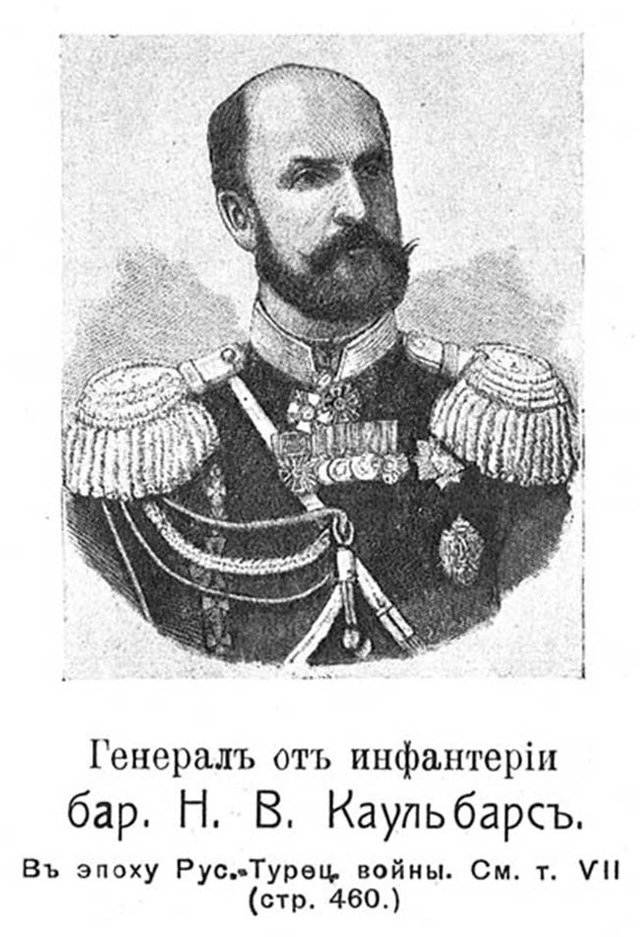Bulgarian crisis (1885-1887)
After the coup on August 9, 1886 and the abdication of Prince Alexander I from the Bulgarian throne, dictated by Captain R. Dimitriev, a group of influential political and military leaders, led by Stefan Stambolov and Lt. Col. Sava Mutkurov, organize a counter-coup and return the head of state back to Bulgaria.
Prince Alexander I Battenberg

Firmly convinced that Russia and its emperor Alexander III would not allow him to remain on the throne and that his stay in Bulgaria would harm the country, the young prince sacrifices his throne, believing that in this way he will bring only good things to his principality. After his repeated abdication, he turns to Stambolov and the officers and politicians accompanying him, with the words:
“Wherever I go, whatever providence has prepared for me, my thoughts will always and everywhere be only about Bulgaria! God bless our Fatherland!”
Time of Troubles
A period has come in Bulgaria, which some contemporaries have called the "Time of Troubles." Left without a ruler, the Principality of Bulgaria was governed by the Regent Council until the election of a new prince. Alexander Battenberg chose Stambolov, Petko Karavelov and Mutkurov in
as regents, but Karavelov refused this post, disagreeing with the policies of the other two regents.
The refusal of Karavelov caused the resignation of the other regents, and on November 1, the regents were re-elected - Stambolov, Mutkurov and Georgi Zhivkov. They ruled the principality, until Prince Ferdinand von Saxe-Coburg-Gotha ascended the Bulgarian throne under the name Ferdinand I.
Principality of Bulgaria and eastern Rumelia. 1882

Office of Regents is one of the most dramatic periods in the history of Post-Liberation Bulgaria. It was acutely felt that the existence of the principality was in question. Rumors about the planning of the Russian occupation of the country were discussed in all the governments of large European states. Great forces, each driven by its own interest, took a wait and see attitude. Regents turned to Russia with a request to guarantee the existence of the state, but the answer was uncertain.
As overlord, the Turkish sultan strove to guarantee, through diplomatic ways, the military non-interference of the Great Forces in the affairs of the vassal principality, provided that calm and order were maintained in Bulgaria.
On September 13, 1886, Major General Nikolai Vasilievich Kaulbars arrived with the diplomatic mission as the envoy of the Russian emperor. The purpose of his mission was clearly stated before the English ambassador in Vienna on September 5:
"The emperor sends me to tell the Bulgarians that they must maintain public order and calm in their country if they want to prevent occupation. His Majesty sincerely wants all things to go peacefully, but if strife appears, it is impossible to foresee what measures the events will require."
Baron Nikolay Vasilievich Kaulbars

The confrontation he had undertaken with the regents and authorities in the principality was a prelude to several unfortunate attempts at riots, raised by officers devoted to Russia, both Russian and Bulgarian. From the point of view of the Bulgarians, Kaulbars behaved ambiguously, almost treacherously and cunningly. On the one hand, he called for calm, and on the other, he asked the Russian ministry to send Russian ships to occupy the Principality of Bulgaria. Kaulbars mission ended in November 1886 with the termination of diplomatic relations between the Russian Empire and the Principality of Bulgaria.
Riots
The fall of 1886 was full of events. On September 28, elections were scheduled for the Great National Assembly. At this time, in the city of Dupnitsa, a pro-Russian crowd, lynched the manager, and then disappeared into the Russian consulate. In Sofia, there was also an attack on an elected bureau and the attackers also fled to the Russian embassy. The embassy surrounded the company of foot soldiers and demanded the extradition of violators of the order.
On October 12, Kaulbars declared the Great National Assembly illegal, and on October 13, newspapers informed the population that two Russian military ships left Odessa and were heading to Varna.
The ship “Run” arrived in Varna on the evening of October 13. Stambolov planned to move the Bulgarian government to Vidin and fight to the death in case of a threat of occupation.
On October 17, the “Memory of Mercury” ship arrived, with 18 guns. On October 19, the Great National Assembly was convened in Tarnovo. Meanwhile, the Russian consul in Ruse, Shatokhin, offered the regents several candidates for the Bulgarian princes - the Duke of Oldenburg and General Gurko.
Stambolov began to doubt that these, in his opinion, frivolous candidates were intended to lull his attention. He suspected that an armed action was being prepared. It was expected that this would happen in Ruse, where officers gathered - participants in the coup against Prince Alexander. They were released after the congregation of the Russian emissary General Kaulbras on the day of the arrival of “In memory of Mercury” in Varna. Unexpectedly for all, such actions took place in southern Bulgaria - in Perushchitsa, Burgas and Sliven. They were organized by the Russian consul in Plovdiv with the active support of the Russophiles. The plan was to create unrest in order to give the Russian sailors an occasion to leave the ships on Bulgarian land. Attempted armed action in Perushitsa failed due to poor organization and passivity of the population.
Nabokov
The leader of the rebellion in Burgas was the retired Russian captain Nikolai Nabokov, suspected back in May of this year of complicity in the conspiracy to abduct Prince Alexander in Burgas. Remaining in the city, apparently of his own will, he walked around in Russian uniform, drank and scolded the Regency. On October 21, Russophile officers gathered at Nabokov’s house, led by Lieutenant Kishelsky, Russian Lieutenant Zalevsky, and other civilian and military personnel.
Nabokov read a telegram from Kaulbars to them that the time had come for armed resistance against the regency and it was time to act. The next evening, Lieutenant Kishelsky was on duty, and at dawn led the arrests of several military Regency supporters in the garrison and the city.
Most of the troops in the garrison joined the rebels. The garrison commander, Captain Karaivanov, was warned by the sergeant major and managed to avoid being arrested by walking on foot to Aytos for reinforcements. Meanwhile, the garrison troops seized important points in Burgas, and Nabokov organized an interim government and went to Ankhialo to pick up reservists.
At this time, Captain Karaivanov returned to Burgas with 60 soldiers from Aytos and managed to convince the military to go over to the Regency. Arrested citizens and officers were released, and Nabokov was captured in Ankhialo. Other leaders of this bloodless riot fled. The rest disappeared into the Russian consulate.
To finally repay the riot, the regents sent their most uncompromising officer, Costa Panitsa.
On October 26, the ship Race arrived from Varna to support the Russian consulate, but Major Panitsa allowed only officers to land. On October 27, a military trial of the rebels began.
Court
During the trial of Nabokov, the Russian consul forbade Nabokov to say anything here, because the consul did not recognize this court and was going to take Nabokov from here and send him to Russia.
As a Russian subject, Nabokov was convicted, but after that he was handed over to the Russian authorities. A year later, in December 1887, he landed on Bulgarian territory at the head of a rebel squad,
funded by the Russian government, but the detachment was defeated and captain Nikolai Nabokov died in battle.
Thank you for your time and attention.
Follow me for more content to come!
[//]:# (!steemitworldmap 42.485436 lat 27.452751 long d3scr)
With love from Bulgaria @varya-davydova
My telegram channel https://t.me/varyadavydovabg
Congratulations, Your Post Has Been Added To The Steemit Worldmap!
Author link: http://steemitworldmap.com?author=varya-davydova
Post link: http://steemitworldmap.com?post=bulgaria-chronicles-of-the-time-of-troubles-riot-of-nabokov
Want to have your post on the map too?
Downvoting a post can decrease pending rewards and make it less visible. Common reasons:
Submit
Hi varya-davydova,
Visit curiesteem.com or join the Curie Discord community to learn more.
Downvoting a post can decrease pending rewards and make it less visible. Common reasons:
Submit
Incredible the event, despite being a very important issue in its time, today has advanced and have not been cultured of this crisis. Thanks for sharing, excellent article!
Downvoting a post can decrease pending rewards and make it less visible. Common reasons:
Submit